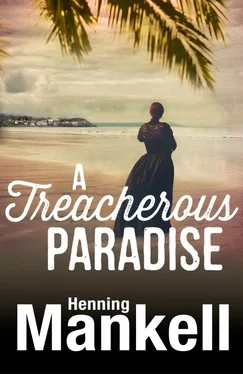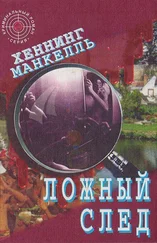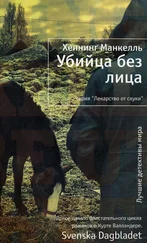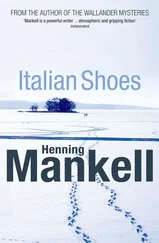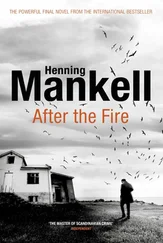‘I think she wanted to show everybody who she was,’ said Felicia.
Hanna tried in vain to work out what she meant by that.
‘I don’t understand your answer. Explain for me why she decided to take her own life in that filthy dock, and why she undressed before doing so.’
‘Nobody has found her clothes.’
‘How am I supposed to interpret that? That they have just vanished into thin air? Or that somebody has stolen them?’
‘All I know is that they weren’t there on the quay. Nobody saw her coming there with no clothes on. Nobody saw her jump into the water. Perhaps she was carrying large stones in each hand, to make sure that she sank.’
‘But why should she do that with no clothes on?’
‘Perhaps she did have clothes on when she jumped into the water. And then took them off before she died.’
‘Why?’
‘Perhaps she wanted to die in the same way as she had lived.’
Although she still didn’t really know what Felicia meant, Hanna suspected that she was trying to make a comment about Esmeralda’s death. Dying the way she had lived. With no clothes on, naked to the world.
Hanna asked no more questions. When Felicia had got off at the front gate of the brothel, which was being guarded by Judas, she asked the man pulling the rickshaw to go back up the steep hills to her house. He was dripping with sweat when they got there. She paid him twice as much as he had asked for, but even so it was only a few escudos, worth next to nothing.
Julietta was standing in the entrance, looking at her. Hanna could see the curiosity in her eyes, but didn’t want to talk to her. She simply gave the maid her hat and parasol and told her that Dr Meandros should be allowed in the moment he arrived. She took it for granted that Julietta and the rest of the staff in the house already knew that Esmeralda was dead. Invisible or silent messages were passed with astonishing speed among the blacks of Lourenço Marques.
Carlos was sitting on her desk chair chewing at a carrot when she entered her study. She let him stay there, sat down on the visitor’s chair and closed her eyes.
When she woke up she realized she had been asleep for four hours, a deep and long sleep that felt as if it lasted a whole night. There was no sign of Carlos. She went over to the desk chair and sat down. She had been dreaming. Unclear fragments slowly rose up into her mind. Lundmark had been in it. He had been sitting at the brothel piano, hesitantly fingering the keys. The jacaranda tree had been cut down. Senhor Vaz had been wandering around in a dinner jacket, smoking a cigar that smelled like the fires caused by the rioters. But she couldn’t see herself in the dream. She hadn’t taken part in it, was simply an observer on the outside, looking in.
She summoned Julietta, ordered tea, then sent her brusquely on her way — as if to remind her that she still hadn’t forgotten Julietta’s outrageous request to be transferred to the brothel.
She had just finished drinking her tea when Dr Meandros arrived at the front door. When he came up to her study she could see that his hands were still dirty. There were what could well have been dried bloodstains on his scruffy jacket.
He sat down and asked for a glass of wine. When Julietta brought a glass on a tray, he emptied it as if he had been dying of thirst. But he declined firmly the offer of a second glass.
‘There’s no doubt that the woman committed suicide,’ he said. ‘Her lungs were full of dirty water from the dock. It would be sufficient, of course, to give the cause of death as drowning, but I made a more comprehensive examination of her body. Visiting and travelling through a person’s intestines can be an adventurous journey. I was able to ascertain that she had probably given birth to a lot of children. Her obesity had resulted in deposits in her blood vessels and brain. Her body was old for a woman who was as young as I take it she was.’
Hanna interpreted that last remark as a question.
‘She was about thirty-eight. Nobody knows her exact age.’
‘That can probably be an advantage for black people,’ said Meandros thoughtfully. ‘For those of us who know the date and perhaps even the time of day or night when we were born, it can be a confounded nuisance being constantly reminded of the exact moment. A rather more vague time is preferable in many ways.’
Meandros seemed to be lost in his own thoughts for a while. Then he continued.
‘The most interesting and surprising thing, however, was that she had a very big and particularly flourishing tapeworm inside her stomach and intestines. I wound it around one of my walking sticks and measured it with a tape measure: it was four metres and sixty-five centimetres long.’
Hanna pulled a disgusted face. Meandros noticed her reaction and raised his hands in apology.
‘I don’t need to go into any more details,’ he said. ‘The body can be released for burial. I have signed the death certificate and given the cause of death as a clear case of suicide.’
‘I shall pay for the burial.’
Meandros stood up, swayed suddenly as if he had suffered an attack of dizziness, then held out his hand for Hanna to shake. She accompanied him down to the front door.
‘What do they usually die of?’ she asked.
‘The Africans, you mean? Diabetes is rare. Heart attacks and strokes are also quite unusual. The commonest causes are infections cause by malaria-carrying mosquitoes, dirty water, too little food, too little dietary variation, too heavy work. There is a vast chasm between our ways of living and our ways of dying. But tapeworms can affect white people as well.’
‘How do we get a tapeworm inside our bodies?’
‘We eat them.’
‘Eat them?’
‘By accident, of course. But once they get into your body, they stay there. Until they eventually decide it’s time to leave. They say it has happened that tapeworms have left bodies through the corner of an eye — but the usual route is of course the natural way.’
Hanna didn’t want to hear any more. She also doubted if what he said about the corner of an eye was true. She opened her purse to pay the doctor for his visit, but he refused point-blank to accept any payment. He raised his hat and set off on the walk down the hills to the hospital where he had as much responsibility for the dead as he had for the living.
The next day Felicia went to visit Esmeralda’s family. Hanna had decided to close down the brothel during the afternoon when the burial was to take place. This had never happened before, despite the fact that several of the women had died during Senhor Vaz’s time. Hanna also made sure that all of the women had decent black clothes. When they eventually gathered as a group, all dressed in black with dark hats and veils, it seemed to her that it was a ghostly collection she had standing there before her. They all seemed to be dead already.
A funeral procession of the dead. Dead people mourning a dead person. And in parallel with all this, the thought of the almost-five-metre-long tapeworm. Her desire to throw up came and went in waves.
Hanna had hired a horse-drawn hearse with benches at the sides. Felicia was waiting in the cemetery, with Esmeralda’s husband and children. Felicia whispered to Hanna that Esmeralda’s ancient father was also present. They gathered around the open grave where the coffin was resting on two rough wooden trestles.
The cemetery was split in exactly the same way as the town: on the right, just after the entrance, were the resting places for the whites — marble sarcophagi or impressive mausoleums. Then an area of less imposing graves, and beyond that the field where the blacks were buried. Their graves were marked by rickety wooden crosses, or nothing at all. Hanna decided on the spot that Esmeralda would have a decent gravestone with her name on.
Читать дальше
